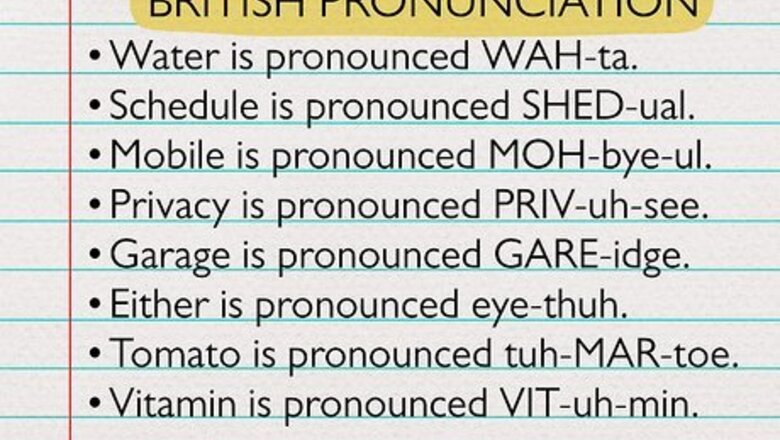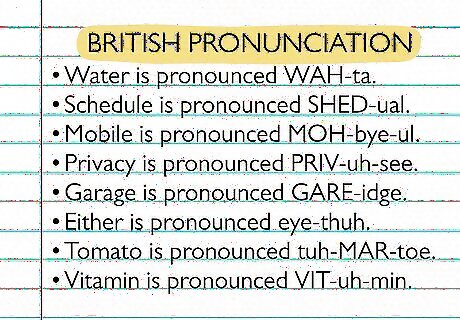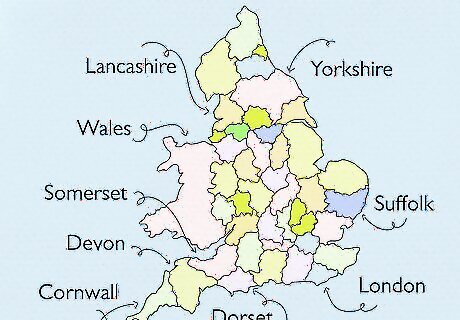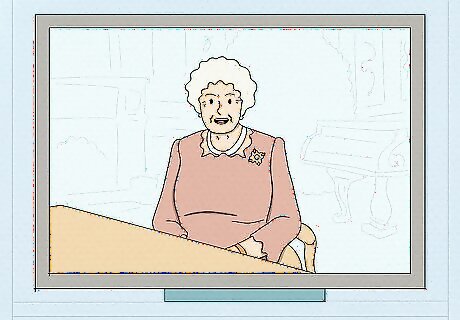
views
Practicing Your British Accent

Practice saying some common words using a British accent. Before you dive into learning how to speak full sentences with a British accent, try practicing with a few simple words. Here are a some common words and how to pronounce them using a British accent: Water is pronounced WAH-ta. Schedule is pronounced SHED-ual. Mobile is pronounced MOH-bye-ul. Privacy is pronounced PRIV-uh-see. Garage is pronounced GARE-idge. Either is pronounced eye-thuh. Tomato is pronounced tuh-MAR-toe. Vitamin is pronounced VIT-uh-min.

Choose someone to imitate. To keep your accent consistent, pick one British speaker to mimic. Opt for a public figure who's been recorded extensively in interviews on a wide variety of subjects, which will likely increase the vocabulary that they use. Choose someone of similar build to yourself so you can mirror them more exactly. Also find someone with the same temperament as you so that you have to "act" less; for example, if you're a quiet introvert by nature, imitating someone who's more bombastic would probably be more tiring and unconvincing.

Watch the speaker talk. Since the difference in accents is largely produced by the way a speaker physically forms sounds, study the speaker's throat, mouth, tongue, and jaw as they talk. Note the way Britons refrain from grinning like Americans when they speak and how they open their mouths vertically instead of horizontally; for instance, picture Alan Rickman saying, “Ho ho ho,” in Die Hard. Although it's hard to see, another British tendency is to make much more use of the tip of their tongue than Americans do. Strengthen your own tongue by practicing consonant-sounds repeatedly, making sure to use the tip of your tongue to full effect.

Copy the speaker. Using video samples, play clips of the speaker talking. Then repeat what they said in your British accent. Use a mirror or a computer's camera to watch yourself as you do so. Match the way you set your face, throat, and mouth to that of the speaker. Mimic all of their body language as well to mirror them more closely. Start small. Play short clips at first. Find ones where the speaker is using simple, common phrases that you normally use, too, so you can spot the differences between their pronunciation and your own more clearly. Expand your rehearsals. Once you've mastered mimicking short phrases, begin tackling longer speeches. Gradually increase the number of lines you repeat at one time. If you're watching an interview, practice lengthy answers individually. Then try answering multiple questions with lengthy answers, all in one go. Continue building each rehearsal until you're performing the speaker's entire interview. Also start expanding your sources. Find material where the person you're imitating experiences strong, genuine emotions as they speak. Note how this effects their speech.

Record yourself. As you attempt speaking in your British accent for longer stretches, record each one. Play them back and listen for where your British accent weakens and your natural accent (or some other British accent that slipped in there by mistake) emerges. Identify whether that was simply due to fatigue or if it's a common flaw that you're repeating elsewhere in similar circumstances. If replicating a particular sound gives you difficulty, select or come up with a phrase that makes heavy use of it, like a tongue-twister. Practice it repeatedly until you overcome this hurdle.

Rehearse your accent with new material. Pick a book to read out loud, preferably by a British author. Start reading small passages in your British accent. Work your way up to entire chapters. Strengthen your ability to maintain your accent for longer and longer stretches. Record yourself as you read to play back later on and find where you've slipped.

Study your British accent in depth. Whether it's a regional accent or the Queen's English, once you decide on one to develop, listen closely to video samples. Start with short clips of common phrases shared by Americans and Britons. Pay close attention to the following: Vowels Consonants Stressed syllables Intonation
Studying British Accents

Divvy the UK up by region. Just like America, Britain has no one single accent, but several scattered across the land. Familiarize yourself with each. While you don't have to master mimicking them all, develop an ear to tell them apart so you can catch yourself later on should you slip in mid-sentence from one regional accent to another. Areas with their own distinct accent include: London/Cockney Suffolk Dorset/Somerset/Cornwall Devon Yorkshire Lancashire Liverpool Northern Ireland Scottish Highland Scottish Lowland North Wales South Wales

Listen to samples of each regional accent. Use sources that clearly identify where the speaker comes from, such as person-on-the-street features on the BBC news or even game shows when they introduce new contestants. Listen to interviews with public figures whose background is either widely known or easily researched online or with other reference material. Rely on current sources, since accents may change over time. Be discerning with your sources. Think of American media and how well (or poorly) different mediums reflect the way Americans actually talk. Notice how newscasters and public speakers like politicians often adopt speech patterns found nowhere else in society. Watch the countless number of American actors who butcher other American accents in American-made TV and movies. Pick your sources for British accents with that in mind. If you do rely on TV or movies, choose British productions instead of American ones that just happen to feature British actors. Be aware that American productions sometimes direct foreign actors to tone down their accents so American audiences have an easier time understanding them. Also stick to films with contemporary settings, as opposed to period pieces, since accents and lingo may change over time.

Find samples of Received Pronunciation. Learn the difference between regional accents and the RP, otherwise known as the Queen's English. Listen to audio clips of the Queen (obviously), other royals, elected officials like Prime Minister David Cameron, and BBC newscasters. Note the uniformity of accent between speakers, regardless of their origins. Learn the difference between sounding “posh” (the RP) and “common” (regional accents.) Historically, British society used to place a great deal of emphasis on the RP as a way to judge each other's social standing. However, this bias isn't as prevalent as it once was, and fewer people strive to speak the Queen's English. Although it's still in use, today you're more likely to hear it from public speakers, such as government officials, newscasters, and actors. As the center of Britain's government, finances, and culture, London is where the RP is most likely to be heard.

Test yourself. Once you feel like you have a grasp on recognizing various British accents, see how well your ear can pick them out. Ask a friend to find new audio clips of different British speakers. Try to identify each speaker's origin by their accent alone.
Paying Attention to Your Own Accent

Listen to your peers. Hang out with friends and acquaintances who grew up in the same region as you. Imagine that you're only hearing their accent (and thus yours) for the very first time. Pretend you're a recent transplant to the area who grew up somewhere else entirely. Pay close attention to the way they pronounce and string words together. In particular, keep an ear out for: Vowels Consonants Stressed syllables Intonations

”Feel” yourself when talking. When you speak out loud in your own natural accent, pay attention to your body. Note how your throat, mouth, tongue, and jaw work together to produce sounds. Since Americans and Britons use their muscles differently to pronounce the same language, familiarize yourself with how your own muscles produce vocal patterns that are uniquely American; this way, you can better identify those signatures creeping back into your voice when you attempt a British accent later on. American tendencies include: Speaking with a wide mouth to the point of grinning or almost grinning. Replacing T's with D's; for example, pronouncing “batter” as “badder.” Creating sounds in the back of their mouths, in or near their throats. Lumping sounds together; for example, “gotta” instead of “got to.”

E-nun-ci-ate clearly. Speak American English “correctly” without losing your accent. Use the correct sounds for consonants. Pronounce each word distinctly. Correct your grammar. Start shedding a few of your American tendencies from your normal speech before adding British ones. For example, instead of saying, “The batter's gotta run round da bases,” make a point of saying, “The batter has to run around the bases.”
Reinforcing Your Performance

Practice, practice, practice. Devote significant time each day to “being British.” Stay in character despite any and all distractions. Stick with it until it becomes totally natural, to the point where you say “Ow!” like a Brit whenever you stub your toe accidentally.

Practice with a native Brit. If you know anyone who's British, use your accent in conversation with them, the sooner, the better. Identify mistakes you're making without realizing it as soon as possible, before they become too ingrained. Let the other person know what you're doing beforehand to avoid offending them should they think that you're just mocking the way they talk.

Test your accent on the unsuspecting. Once you feel confident that you can speak with a fluent accent, try it out on people who don't know you. Go shopping and pretend you're British with the sales staff. Ask people on the street for the time. Engage in as much small talk as you can. Pay attention to the other person. Gauge your performance by their reactions. If they seem incredulous at any point or call you out point-blank, note where you lost them as an area you need to work on more.

Keep up with the lingo. Avoid giving yourself away by using Americanisms in conversation. Immerse yourself in British media (books, films, television) to pick up phrases and key words used in their culture. Learn what's in common usage by everyday Brits (such as “flat,” “loo,” and “lorry”) and what's slang used by specific sub-cultures (like Cockney rhyme-speak). Be wary of relying on some British bands for lingo, since many (especially in rock's early days) emulated American blues and rock, to the point of adopting Americanisms in their lyrics; the Rolling Stones, for example, often used “dollars” instead of “pounds” in songs like “19th Nervous Breakdown.”

Familiarize yourself with British customs. Learn the metric system. Find out how many pence are in a pound (answer: 100) and other currency standards. Know how to read the weather in both celsius and fahrenheit, since both are used in the UK. Pick up as much as you can about British culture so you don't end up undermining your perfect British accent by, say, having no idea what or when Boxing Day is.




















Comments
0 comment